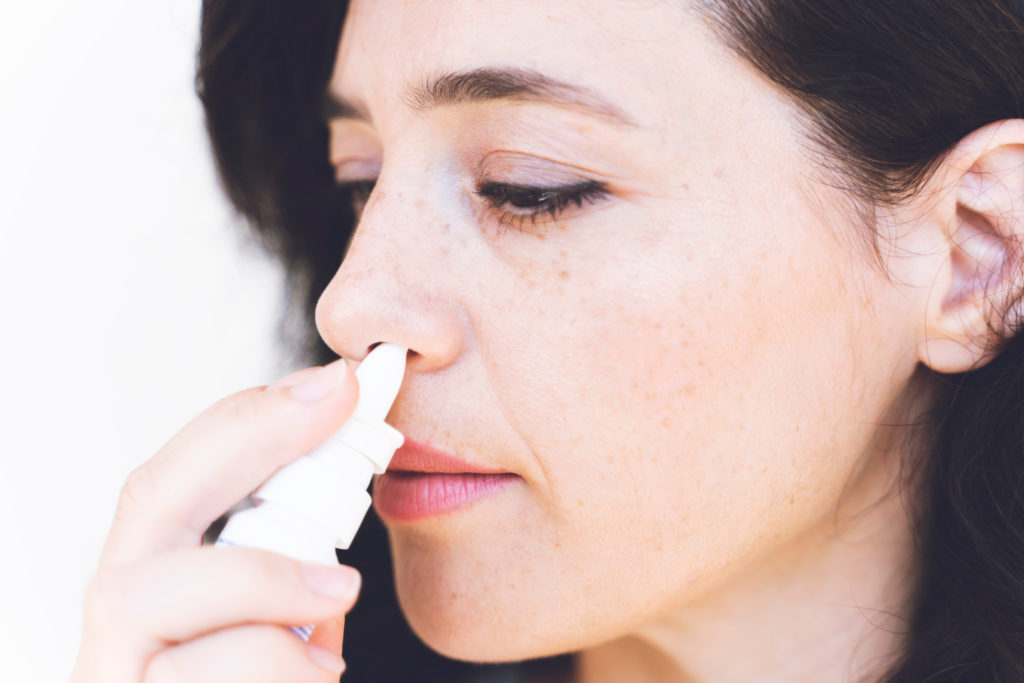October 18, 2022
6 Ways to Get Sleep When You Can’t Breathe Through Your Nose at Night
Nothing is more miserable than tossing and turning because you can’t breathe through your nose at night. You might be congested due to a cold, allergies or sinusitis. But, you could be contributing to your own misery.
It might all come down to some of your daily habits. Most of us take our noses for granted, and often, we pay for that neglect at night. Here are six ways to soothe your nose into free and easy breathing while you sleep.
Put gravity to work for you.
During the day, you probably spend most of your time upright. This makes breathing a whole lot easier. Mucus — a major culprit of every stuffed-up nose — is directed away from your nose and sinuses. It moves to the back of the throat, where it’s swallowed.  It might sound gross, but you probably don’t even notice it.
It might sound gross, but you probably don’t even notice it.
When you switch from a vertical to horizontal position, you put a kink in this natural drainage process. So, if you sleep flat on your back, it may not take long before you feel like you can’t breathe through your nose at night.
Do your nose a favor and prop up your head at night. Use a stack of comfy pillows to lift it up. You can even raise the head of your bed by sliding a few blocks beneath the frame. Alternatively, you may want to invest in a motorized bed that lets you change your position so you can keep your head above your chest. All of these are great ways to prevent mucus from plugging your nose.
Skip late-night dinners and snacks.
What does eating have to do with being able to breathe through your nose at night? It turns out giving your body too much to do right before it’s supposed to slow down and rest isn’t a good idea. When you sleep flat on your back, stomach acid that digests food flows up into your esophagus. This causes burning pain in your chest known as GERD (gastroesophageal reflux disease)—or acid reflux.
You may not know it, but one of the other symptoms of GERD can be a stuffed-up nose. Acid reflux can trigger nasal irritation that causes congestion. To lower your chance for reflux — and improve your chances of breathing freely through your nose during shuteye, stop eating at least three hours before bedtime.
Make your sleep zone a cool, misty oasis — not a Saharan desert.
Your nose has very particular preferences when it comes to where it likes to spend time. The delicate membranes that line your nose need moisture to stay healthy. Dried-out tissues are one of the surest ways to guarantee you won’t be able to breathe through your nose at night.
Set your thermostat on the cool side a few hours before you turn in to give your bedroom time to cool down. Remember, heat removes moisture from the air and makes it dry — maybe too dry for your nose. Place a humidifier by your bed and keep it on while you sleep. It will release a very fine mist of water droplets into the air. The droplets will moisturize your nose, mouth and throat to soothe irritated tissues and swollen blood vessels that add to sinus pain and nasal congestion.
The mist can also help keep dust particles and pet dander from floating through the air — allergens that may be contributing to your stuffy nose.
Water your nose.
OK, it may sound odd, but we mean it. Like most of your body — which is 55 to 60% water — the internal structures of your nose and sinuses need H2O. Water keeps nasal passages moist, thins mucus and prevents swelling that narrows passages and makes it hard to breathe through your nose.
 It’s easy to keep your nose hydrated. Start by drinking plenty of water each day. Most guidelines advise drinking at least eight, 8-ounce glasses of water a day. The exact amount depends on your weight, age, activity level, environment and any health issues you may have.
It’s easy to keep your nose hydrated. Start by drinking plenty of water each day. Most guidelines advise drinking at least eight, 8-ounce glasses of water a day. The exact amount depends on your weight, age, activity level, environment and any health issues you may have.
A hot steamy shower before bed is another easy way to add moisture to your nose. A spritz of saline spray (a saltwater mix) can add moisture to your nostrils, too. Some even contain decongestant medicine. Talk with your family doctor before you begin using saline sprays with decongestants.
Steer clear of smoking.
If you spend part of your day engulfed in a swirl of tobacco smoke, expect your nose to revolt. Tobacco smoke dries out your skin, eyes — and yes, the insides of your nose. It happens whether you are exposed to first-hand smoke or second-hand smoke. Both will make it harder to breathe through your nose at night. Being around smoke can even contribute to chronic sinusitis.
Are you a smoker who’s ready to quit? Talk to your doctor. There are lots of quit aids to help you beat nicotine cravings. Connect with a support group of others working toward living tobacco-free. If you live with a smoker, create a smoking area outdoors to keep the smoke out of your house and lower your exposure to second-hand smoke.
Feel better with a decongestant.
Using one or all of the preventive “nose maintenance” steps we’ve outlined so far can help you fend off sleepless nights with a stuffy nose. Sometimes, though, you may need an assist from medication when you can’t breathe through your nose at night.  An over-the-counter (OTC) decongestant or antihistamine can help you feel better.
An over-the-counter (OTC) decongestant or antihistamine can help you feel better.
Just be sure to pinpoint the cause of your stuffy nose, so you can choose the right medicine. If you have a cold, a decongestant can make it easier to breathe. If you suffer from food, household (pet dander, dust, mites) or seasonal allergies, an antihistamine can stem the allergic reaction that causes congestion and post-nasal drip. If OTC meds don’t offer relief and you still can’t breathe through your nose at night, you may need a prescription medicine. Talk with your pharmacist for help in selecting the right OTC medicine for your congestion.
When to see your doctor.
If your stuffy nose doesn’t show signs of improvement after treating symptoms for more than three days — or if you have a fever — visit your doctor for help. In fact, it’s a good idea to stay on top of all your regular wellness checks. It’s the best way to make sure health issues are found early when they can be treated more easily.
DISCLAIMER
The information featured in this site is general in nature. The site provides health information designed to complement your personal health management. It does not provide medical advice or health services and is not meant to replace professional advice or imply coverage of specific clinical services or products. The inclusion of links to other web sites does not imply any endorsement of the material on such websites.